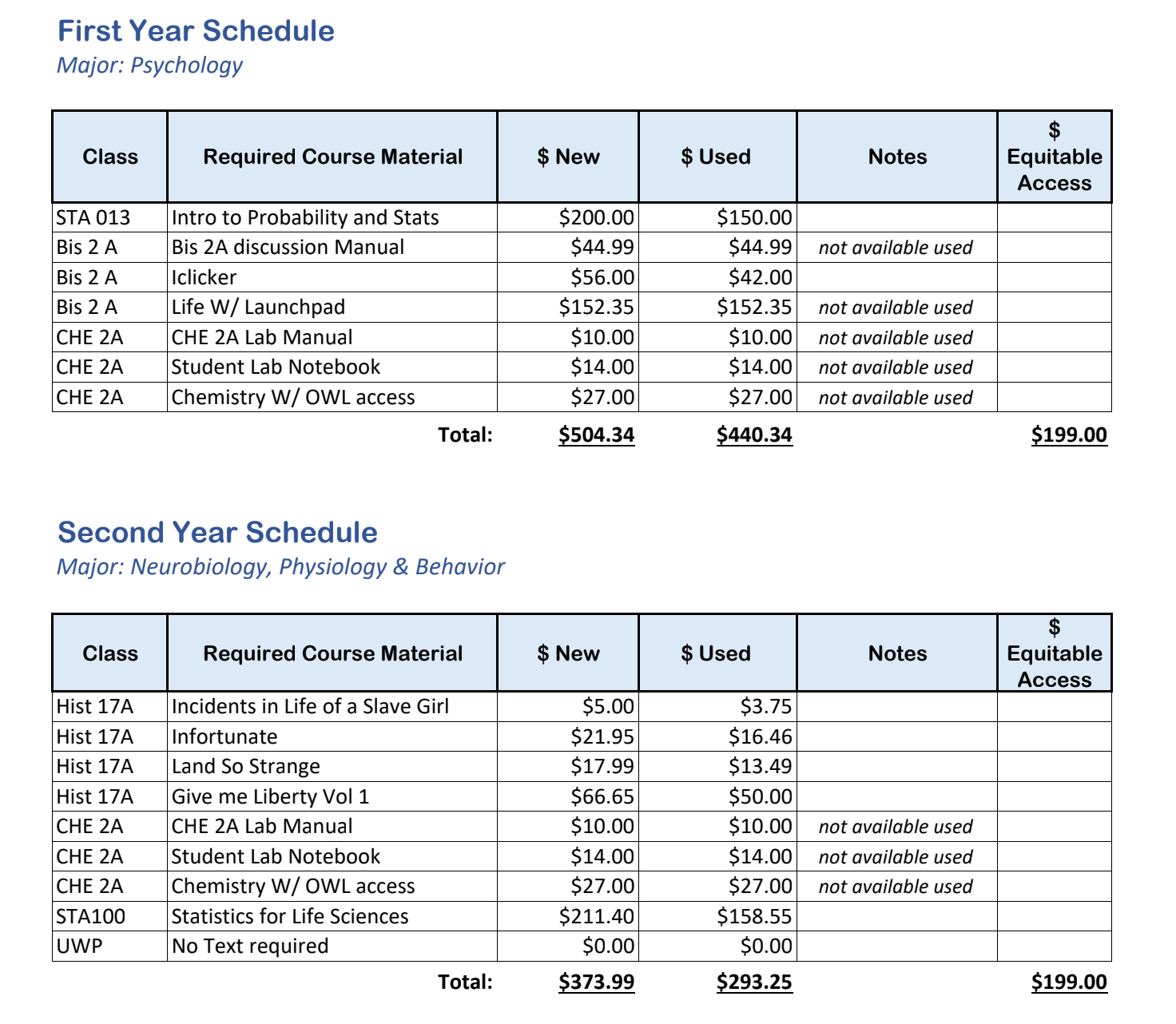Program creator says it will reduce financial inequity, but students and administrators voice concerns about price and obscure opt-out mechanism
This article was updated on Aug. 16 to reflect that the opt-out period begins on Aug. 25.
Equitable Access, announced in mid-2019, is an online textbook program that gives students access to all of their required texts for a flat fee of $199 per quarter. The program was built to address the inequity caused by differing college textbook prices, which vary significantly across majors. Starting this summer, however, students have questioned how much Equitable Access will actually increase accessibility.
Though every undergraduate student is automatically opted in to this program each quarter, many are unaware of the program’s existence.
The email alerting students to the program is easily mistaken as a promotional advertisement for the bookstore, Reddit users said in a thread, and was sorted out of people’s inboxes by spam filters. Some users said they never received the email at all.
The opt-out period lasts from Aug. 25 to Sept. 10, with the final opt-out date almost three weeks before classes start.
For students who add classes on the first day of fall quarter, or who choose to wait until the first week of school to purchase textbooks, the program is inconvenient.
Yu Cheng Wang, a second year computer science major, said his typical process for acquiring textbooks starts the first day of class: he decides what classes he likes, then checks if he needs a textbook.
“Then I ask, ‘Is this textbook required? Is it available for free in the library?’” he said. “It takes 10, 20 seconds to copy and paste the textbook [title] into Amazon, and that’s going to save you more money than you ever will under the ‘Equitable Access’ program.”
Other students wonder about the implications of using this program while taking a series of classes such as CHE 2, BIS 2 or MAT 16.
“Imagine if you were taking a series of classes and had to pay for the book repeatedly since Equitable Access is a subscription model,” said Reddit user Miniland1333. “And of course, you can’t resell your digital textbook.”
According to Executive Director of Student Affairs and architect of the program, Jason Lorgan, these fears are grounded in a lack of comprehensive information about Equitable Access.
He said students are able to opt out up until the end of the add-drop period for class registration as long as they email equitableaccess@ucdavis.edu or go to guest services at the bookstore.
Similarly, students will be able to access their books after the course is over using the bookshelf tool through Canvas, he said.
“If you make a bookshelf account, once the term is over and [the book] is not on your Canvas page anymore, it will still be in your bookshelf,” Lorgan said. “With Equitable Access, as long as you put [the books] into your bookshelf, you’ll be able to keep it.”
Wang questioned whether the bookstore would be able to handle the volume of emails they may receive as students try to opt out after they are able to do so on MyBill.
“I’m not sure how in the beginning of fall quarter everyone trying to email the bookstore is going to work out,” said Wang. “And we all know how hard customer service is.”
Lorgan said he wasn’t surprised by the backlash that the program has received from students.
“Complaints about textbooks have been happening for over 100 years,” Lorgan said. “So the fact that students are complaining about textbooks is absolutely nothing new.”
Lorgan explained that he predicted student concerns surrounding Equitable Access based on student reception of similar programs such as Inclusive Access, which he also spearheaded.
“We’ve always expected that at least 15% of our students will opt out of the program, and 15% of the undergraduate population is 4,500 students,” Lorgan said. “There’s currently a petition out there against this program, but it’s within what we fully expected. We expect to get the most opt-outs in the first term when people don’t understand the program.”
Mikayla Wall, a third year genetics and genomics major, started a Change.org petition calling for the program’s cancellation. It has amassed nearly 4,000 signatures, and one of Wall’s reasons for creating the petition was the cost posing an additional barrier to her education.
“I don’t know if I’m even going to be able to afford to keep going to school, let alone pay this enormous fee for e-books,” Wall said.
In addition to the high price tag, Wall criticized the publishing companies the bookstore negotiated with in order to create Equitable Access for blatantly charging more than e-books are worth.
“[An E-book is] not worth as much as a physical copy because with physical copies there’s the cost of printing the papers, there’s the cost of writing the whole thing, there is the cost of publishing again,” Wall said.
She added that an E-book, after the initial labor that came with writing it, could be distributed by the publisher to as many people as they like with no extra cost.
“Why would you charge ridiculous amounts for something that you’re barely paying for?” Wall asked.
But students aren’t the only ones concerned about the new program. Academic Senate Chair Kristin Lagattuta and Vice Chair Richard Tucker expressed their apprehension for the program in an email to Chancellor Gary May, Provost Ralph Hexter and Interim Vice Chancellor Emily Galindo.
“Although we believe it is a worthy goal to pursue textbook cost reduction for students, we cannot support the Equitable Access pilot program in its current iteration,” Lagattuta and Tucker wrote. “We simply do not have evidence that this program will collectively benefit students and faculty.”
The letter introduces eight concerns regarding the program, including excess influence on faculty when deciding required texts for classes, the opt-out rather than opt-in nature of the program, removal of student agency over financial aid and cost.
Still, Lorgan said that the cost of Equitable Access for many students may be far less than the price of new or even used textbooks.

Tables created by UC Davis Bookstore comparing the price of new and used textbooks with the flat rate of Equitable Access.
A search on the UC Davis Textbook Marketplace Facebook group yields different results. The STA 013 book is listed for $5, the BIS 2A text for $50 and an Iclicker for $10. There was a lab notebook listed for $5. Without the BIS 2A discussion manual, the CHE 2A lab manual and the chemistry textbook with OWL access, this totals $70.
“Anyone that tries will be able to get their materials for under $200 per quarter,” said Reddit user from_narnia. “Most of the time under $50 or even free. I’m a STEM major and the most I’ve had to pay is $30. This is only because the professor required us to buy ‘online access’ to do homework.”
Though all UC Davis students pay the same rate for tuition, fees, and health insurance, the prices for textbooks vary widely from major to major, with STEM students paying the most for their texts.
“Equitable Access will reduce this financial inequity so that every student has access to the same academic opportunities, regardless of the field in which they choose to study,” the Inclusive Access website reads.
“From our perspective, we’re adding an option that doesn’t exist today, but all of the options that students have used for hundreds of years are still there,” said Lorgan. “And so if you don’t like this, keep doing what you’re doing.”
Written by: Jessica Baggott — campus@theaggie.org










